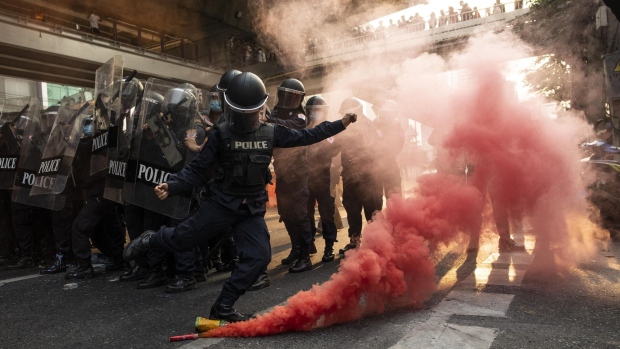Mar 16, 2022
Greenwashing Is Increasingly Making ESG Moot
, Bloomberg News

(Bloomberg) --
The concept behind ESG keeps getting harder to defend.
For years now, managers of big funds touting their supposed focus on the environment, social issues and corporate governance have been faulted for holding shares of fossil-fuel purveyors (including Exxon Mobil Corp. and Chevron Corp.), weapons manufacturers (like Raytheon Technologies Corp.) and mining companies (such as Newmont Corp.).
In fact, the largest ESG-focused exchange-traded fund—the $22.9 billion iShares ESG Aware MSCI USA ETF (ESGU)—has almost 3.1 percent of its assets invested in the oil and gas sector, the industry most responsible for the accelerating destruction of the planet’s atmosphere.
Criticisms of the ESG industry’s increasingly feckless profile have only grown louder since Vladimir Putin launched his war against Ukraine almost three weeks ago, killing thousands so far. Since then, it emerged that so-called ESG funds had at least $8.3 billion allocated to Russian government bonds and companies. While the figure is small compared with the roughly $2.7 trillion devoted to ESG-related funds, the revelation has turbocharged skepticism about the merits of ESG investing.
Putin’s attack even prompted Ukraine’s former finance minister, Natalie Jaresko, to criticize ESG. She wrote in a March 3 column for the Financial Times that the Kremlin’s war raises questions for companies that have “vociferously professed the virtues of environmental, social and governance factors.”
This is “a moment of truth” for ESG, she said. By her read, the phenomenon of greenwashing has now morphed into “ESG-washing.”
“All too frequently, corporations and their executives engage in marketing or obfuscation of what they’re actually doing—what could more accurately be called ‘ESG-washing,’” Jaresko wrote. “Will this prove to be another case of looking the other way?” She called on companies to end their ties to Putin’s regime.
Since Russia invaded Ukraine on Feb. 24, a mass corporate exodus has accelerated, starting with BP Plc and quickly spreading to dozens of other global brands. The unwinding has left companies wondering whether they’ll ever return and, more importantly for them, whether they’ll ever recoup the value of their abandoned businesses in a country that has almost overnight become the world’s most-sanctioned nation—and begun to nationalize those foreign assets.
Professors Elizabeth Demers, Jurian Hendrikse, Philip Joos and Baruch Lev (who recently retired from New York University’s Stern School of Business) pulled together a study questioning why companies were able to retain their high ESG scores after investing so heavily in Russia, a country long plagued by corruption. Among their conclusions was that there is no statistical association between companies’ ESG scores and their response to the Russian invasion.
“If you’re an investor who has been picking stocks based on ESG scores under the assumption that your money is likely to be funding more socially responsible corporate behavior, particularly in periods of extreme crisis such as Russia’s invasion of a sovereign country, you should be very disappointed,” the professors wrote, adding to the chorus of doubters about the usefulness of ESG ratings.
They went on to say that Jaresko is fully justified for calling out companies for “not walking the talk of socially responsible corporate behavior. Our evidence suggests that Russian-invested European firms that have higher overall ESG scores, and even those with higher ‘social’ scores, aren’t more likely to take meaningful action in response to Russia’s invasion of the Ukraine.”
So where does that leave ESG? It’s not clear that all this skepticism is having any impact as money keeps pouring into the sector. Last week, ESG-focused ETFs attracted $1.8 billion, the most since early February, even as the S&P 500 index dropped about 3%.
Proponents of ESG say that skeptics don’t understand how ESG is used in the investing process. It’s not about doing good with your money, per se: They contend it’s essentially a tool to help measure a company’s resilience to financially material ESG-related risks. MSCI Inc., the leading provider of ESG scores, says on its website that the ratings aren’t “a general measure of corporate ‘goodness.’”
Sustainable finance in brief
- ESG investors hold $13.4 billion in military suppliers to Myanmar, where at least 1,500 civilians were shot dead by the ruling junta.
- Vanguard, Northern Trust ESG funds actually grew their stakes in Russia as the Kremlin war on Ukraine approached.
- Wall Street banks start to unwind decades of links to Russia as Putin’s war accelerates.
- Calpers faces a conundrum as it decides whether to dump its bets on Russia.
- China technology stocks tumble after an historic rout, with concerns about the nation’s ties to Russia and persistent regulatory pressure.
Bloomberg Green publishes Good Business every week, providing unique insights on ESG and climate-conscious investing.
©2022 Bloomberg L.P.






